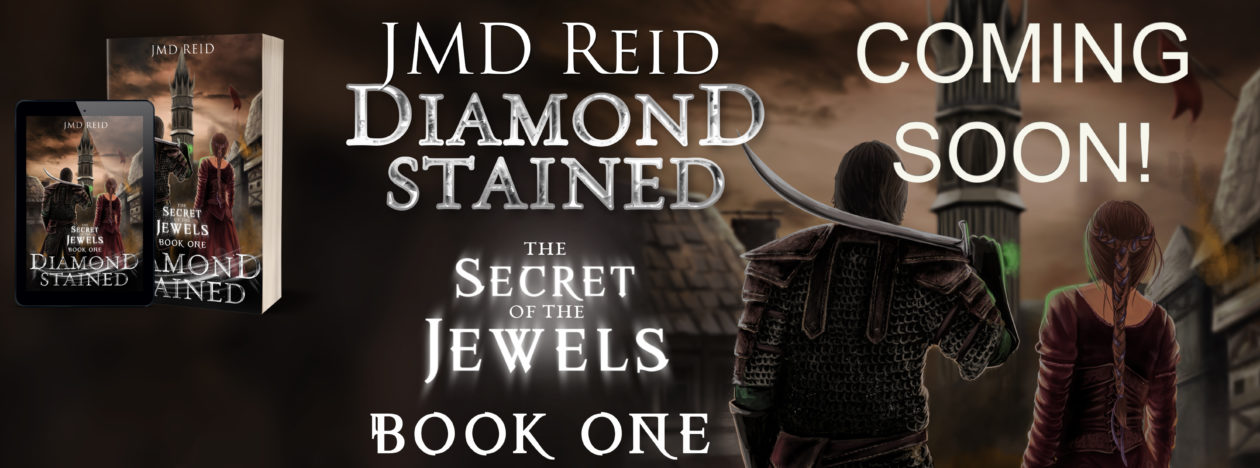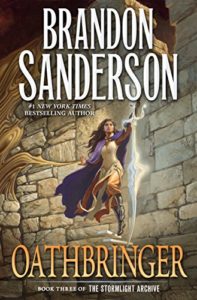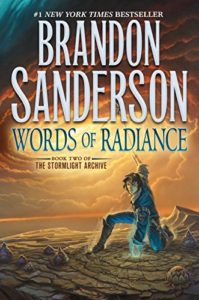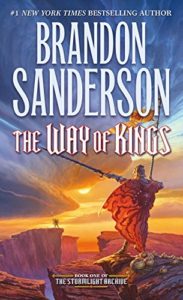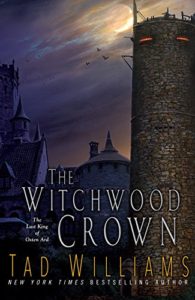Reread of Prince of Nothing Trilogy
Book 3: The Thousandfold Thought
by R. Scott Bakker
The Final March
Chapter 6
Xerash
Welcome to Chapter Six of my reread. Click here if you missed the Chapter Five!
Of course we make crutches of one another. Why else would we crawl when we lose our lovers?
—ONTILLAS, ON THE FOLLY OF MEN
History. Logic. Arithmetic. These all should be taught by slaves.
—ANONYMOUS, THE NOBLE HOUSE
My Thoughts
Well, aren’t these two interesting quotes to have paired up? The first one is a truth we all know. One of the reasons to have a lover is to have that person to support you, to lean on them when things go bad. But when they’re gone, well, you end up like Drusas Achamian learning to walk all over again.
The second quote’s a bit more… interesting. It’s anonymous, which makes me think the person who wrote this might very well be a slave. It’s titled “The Noble House” which implies this is a critique on the nobility, another reason why the author is anonymous. Either he doesn’t want anyone to know he wrote it, or he was killed for writing it and his name was lost to history.
So why would you want a slaves to teach those three subjects? Well, these three subjects are at the core of the scientific world view. They are places were you don’t want to let grandiose ideas or the ego invade. I had trouble understanding this quote, the only connection I can make is to either Achamian teaching Kellhus Gnosis (logic at its purest). Achamian is definitely a lesser person to Kellhus, a slave to Kellhus’s words and manipulation, just like all men are slaves to the darkness that comes before.
Early Spring 4112 Year-of-the-Tusk, Xerash
The Holy War marches south. At Kellhus’s command, they spread out to forage along the way despite their spoils from defeating the Padirajah. The Fanim are not resisting the advances. Villages and towns are surrendering. The Inrithi, wearing looted clothing and weathered by the southern sun, look more Fanim themselves save for their weapons an armor.
They had been transformed, and in ways that struck far deeper than mere accouterments. The men Achamian recalled, the Inrithi who’d marched through the Southron Gates, were but the ancestors of the men he saw now. Just as he could no longer recognize the sorcerer who’d wandered into the Sareotic Library, they could no longer recognize the warriors who’d marched singing into the Carathay Desert. Those other man had become strangers They might as well have brandished weapons of bronze.
The God had culled the Men of the Tusk. Over battlefield and desert, through famine and pestilence, He had sifted them like sand through His fingers. Only the strongest or most fortunate survived. The Ainoni had a saying: breaking enemies, not bread, made brothers. But being broken, Achamian realized, was more potent still. Something new had arisen from the forge of their collective suffering, something hard and something sharp. Something Kellhus had simply lifted from the anvil.
They’re his, Achamian would think, watching their grim ranks file across ridge and hillside. All of them. So much so that if Kellhus were to die…
Achamian spends the majority of his time in the Sacral Retinue or in the “canvas warrens” of the Umbilica, keeping within arms reach of Kellhus to protect him against a Consult assassination attempt. “Kellhus’s ascendancy threatened far more than it had already exacted.” The marching gives little opportunity to interrogate the skin-spies, but no torture Kellhus devices nor Achamian’s Cants of Compulsion work. “The things convulsing in the fecal darkness,” always haunt Achamian afterward.
Achamian couldn’t decide what unnerved him more: their many-fingered faces clenching and unclenching, or the hallowed calm with which Kellhus regarded them. Never, not even in his Dreams of the First Apocalypse, had he witnessed such extremes of god and evil. Never had he felt more certain.
Achamian attends all meetings with the Scarlet Spire, which are “strange, bumbling affairs.” Eleäzaras is drunk all the time, making him seem like a boy who realizes how in over his head he is. With Shimeh looming, the Scarlet Spire is being led by a man terrified of losing against the Cishaurim. Achamian finds him pitying the man “they way those of hale constitution pity those of weak in times of sickness.” The Holy War has tested all men, and it broke Eleäzaras. Iyokus never attends the meetings, which Achamian was thankful for. “As much as he [Achamian] hated the man, as much as he had wanted to kill him that night in the Apple Garden, he could do no more than exact a fraction of what he was owed.” When Achamian watched the Hundred Pillars remove Iyokus’s eyes, he found himself feeling unworthy of passing “final judgment” because only murder was absolute. He only did it for Xinemus.
Achamian observes Kellhus throughout the days as he deals with the mundane matters of organizing a host on the march. It allows him to witness again and again the ‘prodigious depths of Kellhus’s intellect.” He hears Kellhus recite verbatim missives delivered days ago. He could recall every mundane detail which causes other men, especially Gayamakri, the Seneschal-Secretary, to wonder in awe at their good fortune. These sorts of meetings soon begin to bore Achamian. He would be lost in thought, fading into the background.
In spite of his lack of interest, the absurd gravity of his charge was not lost upon Achamian. Sometimes, during moments of boredom, an odd sense of detachment would overcome him as he watched Kellhus. The surreal glamour would fall away and the Warrior-Prophet would seem as frail as the warlike men about him—and far more lonely. Achamian would go rigid with terror, understanding that Kellhus, no matter how godlike he seemed, was in fact mortal. He was a man. Was this not the lesson of the Circumfixion? And if something were to happen, nothing would matter, not even his love for Esmenet.
A strange zeal would creep through his limbs then, one utterly unlike the nightmare-born fervour of Mandate Schoolmen. A fanaticism of person.
To be devoted to a cause alone was to possess momentum without direction or destination. For so long, wandering had been his twilight mission, beaten forward by his dreams, leading his mule down road and track, and never, not once, arriving. But with Kellhus all this had changed. This was what he could not explain to Nautzera: that Kellhus was the incarnation of the abstraction that gave their School purpose. In this one man lay the future of all mankind. He was their only bulwark against the End of Ends.
The No-God
Achamian thinks he’s glimpsed Kellhus’s halo on occasion, envying those like Proyas who do see them. There are times that, despite his hatred, Achamian believes he would die for Kellhus. But he can’t sustain that fervor. Doubts creep in, attacking his belief that he could even protect Kellhus.
Esmenet is another distraction. Sometimes she rides on a horse, growing more comfortable with the act. She often seems a stranger to him with her “acts of mannish boldness” as she gives orders. She’s at her most feminine to Achamian when carried in her palanquin, but he only glimpses of her on those days when she talks to Kellhus as he rides beside her. Achamian wants to call to her. “He almost never saw her eyes.” Only at night, during camping, does he meet her in public spaces, trading cordial nods. At first he thought her behavior cruel to harden her heart into hating him, but then he realized she did it for both their sake. Everyone knows their past relationship, so if she’s nice to him, it will remind others that she once was his.
On their fifth night, Achamian finds Esmenet in his chambers. His ardor for her is crushed as she came only to speak about Kellhus’s security. She acts the empress to him, and he finds himself playing along, feeling their new circumstances both absurd while impressed by her intelligence. He’s even proud of her, thinking she’s always been better than him.
Where others were simply walls to him, Esmenet was an ancient city, a maze of little streets and squares, where he made his home. He knew her hospices and her barracks, her towers and her cisterns. No matter where he wandered, he always knew that this direction led here and that direction there. He was never lost, though outside her gates all the world might confound him.
He knew the habit of lovers, their inclination to make scripture out of self-deception. There was little difference, he often thought, between the devotional verse of Protathis and the graffiti that marred the bathhouse walls. Love was never so simple as the marks with which it was written. Why else would the terror of loss come upon lovers so often? Why else would so many insist on calling love pure and simple.
Achamian realizes that he failed Esmenet by not helping with her burdens, all the “innumerable horrors” she had endured. He encouraged her to dismiss them with anger instead of supporting her. “He shrank from the work of understanding,” and thus failed her.
Small wonder she’d failed him in turn. Small wonder she had… succumbed to Kellhus.
Kellhus… These were the most selfish—and therefore the most painful-thoughts.
Esmenet, through commenting on how men treat their cocks (talking to them, boasting, cursing, cajoling) that she believed “men, far more than women, were other to themselves.” This talk disturbed Achamian especially as he remembers their time together.
Women were windows through which men could peer into other men. They were the unguarded gate, the point of contact for deeper, more defenseless selves. And there had been times, Achamian could now admit, when he feared the raucous crowd that scrutinized him through her almost guileless eyes. All that had consoled him was the fact that he was the last to bed her, would always be the last.
And now she was with Kellhus.
Why was this thought so unbearable? Why did it cramp his heart so?
Some nights, Achamian ponders Kellhus, knowing that the Warrior Prophet will start demanding not just the sacrifice of a lover from others, but of their lives. Though Achamian had lost Esmenet “he had gained his soul.” Right? Other nights all he can think about is Esmenet gasping in pleasure beneath Kellhus, reaching heights of ecstasy Achamian never gave her then picturing her making jokes about his less-than-satisfactory penis. Sometimes he just longed for her “as he’d never longed for anyone or anything.” He believes, desperately, that if he can hold her, she would be his again.
Then it hits him one night: she conceived a child with Kellhus. She never gave up her contraceptive whore’s shell for him. “She had never even mentioned the possibility of children.” He realizes neither had he.
With this recognition, something either broke or mended within him; he could not tell which. The following morning he sat at one of the slave fires, watching two nameless girls tear up stalks of mint for tea. For a time he stared in a blinking stupor, still awakening. Then he looked past them, where he saw Esmenet standing in the near distance with two Nascenti in the shadow of dark horses. She caught his eyes, and this time, rather than nod without expression or simply look away, she smiled a shy and dazzling smile. And somehow he just knew…
Her gates had been closed. She was a direction his heart could no longer go.
Boredom leads Achamian to visit Proyas, the “idea of annoying another struck him as justice.” He’s shocked to find Esmenet also visiting. Things are awkward as memories of Xinemus’s fire—where they used to tease Kellhus, Esmenet was still his woman, Xinemus still had eyes, and Serwë still could laugh—rears in Achamian. He tries to leave, but a drunken Xinemus with “antagonistic good nature only inveterate drunks could muster” tells him to stay. Esmenet agrees, voice strained, motivated by a pity for Xinemus rather then desire to see Achamian.
Achamian can’t help but notice how beautiful she looks now, no longer the “lovely weed” when she was his wife. Only Xinemus doesn’t act awkward as a slave collects dinner plates. Finally, Proyas asks after the lessons Achamian gives Kellheus, which confuses Achamian considering what the lessons were about.
“Yes, with…” He [Proyas] shrugged, as if unsure of their old ways of referring. “With Kellhus.”
Simply speaking the name became something like twisting a tourniquet.
Achamian brushed at his knee, even though he could see nothing that blemished them. “Good.” He did his best to sound lighthearted. “If I somehow live to write a book about these days, I’ll call it On the Varieties of Awe.”
Drunk Xinemus claims Achamian stole his title. Esmenet asks what his title is, Achamian wincing at her sharp tone. “Blind as he was, Xinemus saw slight everywhere,” and was pricklier than Cnaiür. Xinemus proclaims his title of his book is, “On the Varieties of Ass.” Everyone laughs.
Achamian looked from face to beaming face, pressing away tears with his thumb. Memories flooded him. For a moment it seemed that Esmi need only reach out and clasp his hand, press the pad of her thumb against the nail of his own, and everything would be undone. Everything that had happened since Shigek.
All of them are here… all the people I love.
Xinemus explains how his sense of smell is so keen know he can tell that Proyas thought he ate mutton last night, but it was goat. Esmenet laughs so hard, she’s rolling on her back. Xinemus says you see beauty but “there’s truth in what we smell.” Everyone’s laughter trails off.
“Truth!” Xinemus cried with savagery “The world stinks of it!” He made as though to stand up, but rolled back onto his rump instead. “I can smell all of you,’ he said, as if in answer to their shocked silence. “I can smell that Akka’s afraid. I can smell that Proyas grieves. Can smell that Esmi wants to fuck—
“Enough!” Achamian cried. “What’s this madness? Zin… who’s this fool you’ve become?”
The marshal laughs and claims he’s the same man just “minus my eyes.” Achamian wonders how Xinemus got like this. The blind drunk continues saying now he doesn’t live with men but dwells “with asses.” No one laughs.
Achamian thanks Proyas for his hospitality and stands to leave. Proyas sits broken and as “silent as the grave.” Achamian realizes Proyas punishes himself by caring for Xinemus. Kellhus has “rewritten the regrets of many, many men.” Xinemus coughs and Achamian realizes he’s getting sicker. Sneering, Xinemus tells Achamian to flee. Esmenet offers to walk back with him while he wonders, “What’s happened to us?”
“Be sure to ask her,” Xinemus growled as they hurried to the threshold, “why she’s fucking Kellhus.”
“Zin!” Proyas cried, more in terror than anger.
His thoughts buzzing, is face burning, Achamian turned to his former study, bu tin his periphery he could see that Esmenet had turned to him, blinking tears. Esmi…
Xinemus asks if only the blind man can see what is obvious. Proyas gets annoyed, vowing to tolerate Xinemus’s affliction but won’t tolerate blasphemous. Xinemus mocks him, calling him “Proyas the Judge.” Xinemus then quotes a passage from the Tractate about Inri Sejenus healing a blind man name Horomon, a story synonymous with revelation.
Xinemus turned from Proyas to Achamian, as though from a lesser to a greater enemy. “He cannot heal, Akka. The Warrior-Prophet… He cannot heal.”
Achamian still feels the cramped madness from the pavilion after he leaves. He tries grinning at Esmenet to fake relief, but she’s staring off into the darkness. Xinemus’s words echo in Achamian’s head. He and Esmenet walk in darkness through the camp. He remembers holding her hand, hates himself for the longing. “How could he walk in the midst of so much dread wonder and yet feel the tug of her.” He tries to remind himself the Apocalypse is coming. Esmenet ends the silence by asking what happened to Xinemus. It shocks Achamian and makes walking with her more difficult. When he doesn’t answer, she gets angry.
“You think the question stupid?” Esmenet snapped. “You think—”
“No, Esmi.”
There had been too much honesty in the way he spoke her name—too much pain.
“You… you’ve no idea what Kellhus has shown me,” she said. “I too was Horomon, and now—the world that I see, Akka! The world that I see! The woman you knew, the woman you loved… you must know, that woman was—
He couldn’t bear those words, so he interrupted. “Zin lost more than his eyes in Iothiah.”
She asks what he means and starts to talk about the Cants of Compulsion then stops. She reminds him she’s the Master of Spies and needs to know these things. He understands that, but knows she’s doing this because “the estranged always resorted to talk of third parties.” It allows her to talk to Achamian without being either insincere or to delve into their problem. Achamian explains how Cants of Compulsion work, how souls are not compelled but possessed. He talks about how the Scarlet Spire used Xinemus against him. He sees the way her look changes, she’s growing skeptical, thinking he’s fishing for sympathy. He tells her he’s not.
“Then what’s your point?” [asked Esmenet.]
He beat down the anger that welled through him. “The great paradox of the Compulsions is that their victims in no way feel compelled. Zin sincerely meant everything he said to me, he chose to say them, even though others spoke the words.”
In the past, people always challenge how such a thing is possible, question it. Not Esmenet. She just wants to know what Xinemus said.
He [Achamian] shook his head, graced her with a false smile. “The Scarlet Spires… Trust me, they know which words wield the sharpest edges.”
Like Kellhus.
There was compassion in her eyes now… He looked away.
She presses him and he finally admits: “He said that pity was the only love I could hope for.” Only she can understand why that truly hurts him. He wants to hold her, kiss her. Instead, he keeps walking and finds “peevish relief in the way she obediently followed.”
Achamian further explains that by saying things without hope of forgiveness, he can no longer filter his thoughts. Esmenet is surprised by that since it’s been months since the torture.
Blinking, Achamian looked to the sky, saw the Round of Horns glittering in an arc over the northern hills. It was an ancient Kûniüric constellation, unknown to the astrologers of the Three Seas. “Think of the soul as a network of innumerable rivers. With the Cants of Compulsion, the old banks are swamped, dikes are washed away, new channels are cut… Sometimes when the floodwaters recede, things resume their old course. Sometimes they don’t.
Esmenet asks if the old Xinemus is dead, but Achamian isn’t sure if he is. Achamian’s isn’t even sure what he’s even saying. He grabs her “forbidden hand” and she doesn’t resist. He pulls her to her, shocked she’s so light, and feels her wrap around himself “as she had a thousand times.”
They kissed.
Then she was fighting him, striking him about the face and shoulders. He released her, overcome by rage and ardour and horror. “N-no!” she sputtered, beating the air as though fending off the mere idea of him.
“I dream of murdering him!” Achamian cried. “Murdering Kellhus! I dream that all the world burns, and I rejoice, Esmi, I rejoice. All the world burns, and I exult for love of you!”
She stares in shock as he begs to know if she loves him. She doesn’t deny it, and instead says Kellhus knows her like any other. This makes Achamian realize that he was wrong. He does have something to offer you. Frantically, he says Kellhus “knows everyone, Esmi.” He keeps saying it while, still tasting her on his lips. She back away shouting that Kellhus loves her. He can’t put into words his feelings and she flees while he gathers himself. Then he realizes they’re not alone. The watching men look away as he gazes in fury at them.
That night, he beat the matted earth in fury. He cursed himself for a fool until dawn. The arguments were assembled and were defeated. The reasons railed and railed. But love had no logic.
No more than sleep.
When he sees her next, she only has a blank expression, like the kiss never happened. Nor do soldiers come to arrest him, reminding Achamian just who Kellhus is. This isn’t him against another man but him against a nation. “There would be no outburst of jealous rage, no confrontations, only cloaked officials in the night, discharging their writ without passion.” It reminds him of behind a spy. It doesn’t surprise Achamian that Kellhus neither sends anyone nor mentions it since Kellhus needs Achamian too much (the bitter explanation) and because that Kellhus “understood, that he too mourned the contested ground between them.”
How could one love one’s oppressor? Achamian didn’t know, but he loved nonetheless. He loved them both.
Every evening, Achamian meets with Kellhus in what is nicknamed the Scribal Room. Achamian was charged by the Mandate to protect Kellhus from the Consult, but Kellhus doesn’t seem to care about them. Sometimes Achamian felt Kellhus “tolerated him out of courtesy, as a way to built trust with a formidable ally.” Teaching Kellhus the Gnosis is something different that fills Achamian with “wonder and terror.”
From the very first time, even as far back as Momemn, there had been something remarkable about Kellhus’s company. Even then he’d been someone whom others sought to please, as if they grasped without knowing what it meant to stand tall in his eyes. The disarming charisma. The endearing candour. The breathtaking intellect. Men opened themselves to him because he lacked all these deficiencies that led brother to injure brother. His humility was invariable, utterly disconnected from the presence of other men. Where others crowed or fawned depending upon whose company they kept, Kellhus remained absolute. He never boasted. Ne never flattered. He simply described.
Such men were addicting, especially for those who feared what others saw.
Achamian reflects on how he and Esmenet had watched Kellhus grow to “struggle with truths that everyone else had secretly accepted.” They witnessed his humanity, how even has his power grew, even as he became the “Voice and Vessel” to save the world, he remained himself. He never took for granted his power and never required more than his due. “It just so happened all the world fell within the circle of his authority.”
Achamian sometimes finds himself joking with Kellhus like nothing had changed, not even losing Esmenet. Invariably, something would knock him out of the illusion and Kellhus would become something like he were “a kind of lodestone made flesh, drawing things unseen yet palpable into his orbit.” Sometimes, during these moments, Achamian glimpses the halos.
To sit in his [Kellhus’s] presence was overwhelming enough. But to teach him the Gnosis?
To allow Kellhus to retain the protection of the Chorae for as long as possible, they start with everything short of actual Cants. All the language and philosophical pinnings that gird sorcerery. Normally, he would also teach the denotaries, basic Cants to develop a students “intellectual flexibility” first. He can’t with Kellhus because that will Mark him. So he starts with Gilcûnya, the Nonman tongue used for Gnostic Cants. “This took less than two weeks.”
To say that Achamian was astonished or even appalled would e to name a confluence of passions that could not be named. He himself had required three years to master the grammar, let alone the vocabulary, of that exotic and alien tongue.
He starts teaching Kellhus the philosophy of Gnosis, the Aeturi Sohonca (Sohonc Theses). Without these, the “Cants were little more than soul-numbing recitations.” Sorcery depends on meaning, and that depends on “systemic comprehension.” He explains how a word can have different meanings, or connotations, that can varied from person to person, and group to group. He uses love as an example. The feelings of love for a parent are different than for a lover or a friend. An older man and a teenage boy can both suffer heartbreak, but the “former is tempered by loss, learning, and a lifetime of experience, while the latter knows only lust and ardour.”
He [Achamian] could not help but wonder in passing what “love” had come to mean for him? As always, he dispelled such thoughts—thoughts of her—by throwing himself into his discourse.
Sorcery requires “preserving and expressing the pure modalities of meaning.” Kellhus realizes that this is why they use Gilcûnya as their lingua arcana. Kellhus figuring something like this out doesn’t surprise Achamian. He confirms that the “sheer otherness of Gilcûnya serves to insulate the semantics of sorcery from the inconsistencies of our lives.” He adds the Angogic use a debased form called High Kunna for the reason.
“To speak as the Gods do,” Kellhus said. “Far from the concerns of Men.”
He explains about the Persemiota, a meditative technique not needed for the Mandate because of Seswatha inside them. Then he teaches the Semansis Dualis, the final step before damnation (at least until Kellhus came around). He talks about the two halves of sorcery, what you speak (the utteral) and what you think (the inutteral). “Since any single meaning could be skewed by the vagaries of circumstance, Cants required a second, simultaneous meaning, which, though as vulnerable to distortion as the first, braced it nonetheless, even as it too was braced.” Kellhus grasp this immediately, coming up with his own analogy. According to Achamian, thinking one thing and saying another is the hardest step, and why you can’t just hear a Mandate Schoolmarm speak his cants to steal the Gnosis.
Kellhus nodded. “Has anyone experimented with further inutteral strings?”
Achamian swallowed. “What do you mean?”
By some coincidence two of the hanging lanterns guttered at the same time, drawing Achamian’s eyes upward. They instantly resumed their soundless illumination.
“Has anyone devised Cants consisting of two inutteral strings?”
Though Achamian has heard of a legend of the nonman Su’juroit the Witch-King using the “third phrase, Achamian lies and says it’s not possible. Achamian is frightened by the possibilities Kellhus could work and is reminded of the time he participated in an assassination, delivered the poison to slave which resulted in four people dying.
As always with Kellhus, Achamian needed only to gloss the various topics, and then only once. Within the course of single evenings Kellhus mastered arguments, explanations, and details that had taken Achamian years to internalize. His questions always struck to the heart. His observations never failed to chill with their rigor and penetration. Then at last, as the first elements of the Holy War invested Gerotha, they came to the precipice.
Kellhus beamed with gratitude and good humour. He stroked his flaxen beard in an uncharacteristic gesture of excitement, and for an instant resembled no one so much as Inrau. His eyes reflected three points of light, one for each of the lanterns suspended above Achamian.
“So the time has finally come.”
Achamian wants to teach basic Wards, but Kellhus wants the Cant of Calling. Achamian wants to objects, but knows he shouldn’t. He begins to teach the utterals for the Ishra Discursia, “the most ancient and most simple of the Gnostic Cants,” but finds himself unable to speak. Kellhus realizes Seswatha has stopped him, deducing that this is how the Mandate protected the Gnosis. Achamian looks helpless at Kellhus. He truly wanted to teach Kellhus, and now feels shamed that he can’t. It reminds him of Xinemus’s torture.
Kellhus wants to speak with Seswatha, which shocks Achamian. Then Kellhus draws a dagger which reminds Achamian of the type of knives his father used to debone fish. “For a panicked instant Achamian thought that Kellhus meant to debone him, to cut Seswatha from his skin, perhaps the way physician-priests sometimes cut living infants from dying mothers.” Instead, Kellhus hypnotizes Achamian by reflecting light from the dagger into his eyes in a captivating fashion.
He feels something inside of him that restrained him in a “manner more profound than chains or even inhumation.” He knows he speaks, but doesn’t remember what he says. He feels always on the edge of something and then he is out of it. Confused, he starts to ask Kellhus what happened, but is silenced. Kellhus tells him to repeat the spell. This time Achamian speaks the utteral and than the inutteral. Achamian is disoriented by how easy he spoke them then he waits, hovering “between hope and horror.” It took Achamian seven months to master speaking one thing and thinking another, and he started with the denotaries. He knows Kellhus will do it on the first try.
Silence, so absolute it seemed he could hear the lanterns wheeze their white light.
Then, with a faint otherworldly smile upon his lips, Kellhus nodded, looked directly into his [Achamian’s] eyes, and repeated, “Iratisrineis lo ocoimenein loroi hapara,” but in a way that rumbled like trailing thunder.
For the first time Achamian saw Kellhus’s eyes glow. Like coals beneath the bellows.
Terror seizes Achamian. He wonders what Kellhus’s limits are. “What did it mean for a prophet to sing in the God’s own voice.” He wonders if that would make Kellhus a shaman of old. Or was he a god.
“Yes,” Kellhus murmured, and he uttered the words again, words that spoke from the marrow of existence, that resonated at the pitch of souls. His eyes flashed, like gold afire. Ground and air hummed.
And at last Achamian realized…
I have not the concepts to comprehend him.
My Thoughts
Have a call back to book 2 when Achamian and Esmenet gained a height to see the entirety of the Holy War. Kellhus has denied Achamian this just like he’s denied Achamian his wife.
We have Achamian musing on the truth any soldier knows. United in a purpose and thrust into dire circumstances binds men together. They have to work together for their survival, it’s one massive pressure on their behavior, and it forever changes them. Kellhus was then in the right position, thanks to his gamble with the Circumfix, to benefit from that united suffering binding the Holy war.
Further, we see this same level of suffering being used by Kellhus with the Great Ordeal on their march to Golgotterath, especially with the final march across the Fields of Appalling. And that last line, if Kellhus were to die… Well, we’ll see how that third and final series goes.
Achamian mistakes “good and evil” for “pure intellect and pure hunger” the two extremes of humans, both of which Bakker shows us are not “good” or “healthy” behaviors.
We can never know how true stress, true dangers, true survival will place on us. Those who seem strong will break and those who seem weak will withstand. Eleäzaras and Xinemus are examples of the former, two different forms of strength, one perceived as bad one as good, but both crumbled. Achamian and Esmenet would be examples of the later. And then some, like Serwë, just live in a dream world until they die.
Murder is about the only thing you can do to a person where you can’t make amends, can’t apologize, can’t try to do something to make it right. Achamian is giving Iyokus that chance to do that because, as always, Achamian is very self-reflective. He sees the selfishness of his action and can’t allow himself to embrace that sort of confidence retributive justice requires.
We witness the slow seduction of Achamian. How Kellhus would “seem as frail as the warlike men about him” at times, tugging on the compassion inside of Achamian. He is making Achamian see him as vulnerable, something that needs the sorcerer’s protection from the outside world. From the Consult. Kellhus needs Achamian willing to teach him, to surrender the Gnosis to him or he’ll lose against the Consult eventually.
The Halos are more than a mass hallucination. They have to be. Kellhus is touching the outside in some ways. It’s bleeding into him, and those who believe in him see it. Achamian’s doubts keep him from wholly believing in anything. He’s always questioning, which might be way he’s only getting glimpses. He sees them for a moment then they’re gone. Kellhus might very well be a nascent god. Perhaps he will be a god, and since the gods stands outside of time ultimately, capable of seeing its beginning and end, this might just be a manifestation of that. At the end of the series while he died, he didn’t get captured by Ajolki. Kellhus’s soul escaped whatever bargain he made with the trickster god. We’ll have to see what Bakker does with this going forward in the third series.
Achamian never seeing Esmenet’s eyes is a subtle hint that she’s avoiding looking at him.
If you didn’t know it, you can train yourself to hate people. You can also do the opposite. Dwelling on something over and over again bends your thoughts and makes it a truth to your mind. Our brains are quite plastic and malleable.
Bakker again shows us that Achamian doesn’t just want Esmenet back out possessiveness, but he truly cares for her. He’s proud of her growth as a person even though it came at the expense of their relationship.
I think Achamian is coming down on himself too hard here. He doesn’t know the full picture of what Kellhus can do. How he can manipulate. He’s feeling like he deserve this now. That he’s blaming himself for what happened, shifting the blame away from Esmenet. He does this because he still cares for her and the alternative is to hate her. Better to hate himself. It’s a selfish action nonetheless, and these are the ones we always do and always regret.
Men don’t like thinking about the previous sexual experiences of their female partner. It’s a direct comparison of one man’s manhood to another. No guy wants to think his partner is wishing he was someone else. Then it also gets into the reproductive strategies human males employ. Due to the long development period of human children, a decade or so before they can start to be self-sufficient outside the 9 month gestation period, is longer than any other animal, especially when you compare us to species the same size. Elephants don’t take that long to reach independence and they have a lot of growing to do. This in the vast majority of human history (not the little sliver the industrial revolution has brought about in the last two hundred years) has required most women to be tied to the home to raise her children. She needed to a provider. Men responded with the strategy of peer-bonding, building a relationship with a woman as a long term strategy to ensure your offspring thrive. It’s why men can be very possessive about their women. In this case, knowing that you’re the last to ever bed her is important thought. You’ll see that men rarely seek divorce. Even men who cheat on their wives. As an aside, adultery is usually triggered, in men, by the second reproductive strategy: if a woman is offering sex and not asking for commitment, why not reproduce with her? It’s a very basic and primal instinct in men. A hard one for a man to avoid. For a single woman, that sort of behavior, in the past, was quite risky. If she has a child before establishing peer-bond, it makes it harder for her to find a man willing to build that commitment. Once a woman has that commitment, she might engage in a reproductive strategy of cuckoldry if she finds a more suitable man to have a child with and then trick her peer-bonded mate into raising another male’s child or even trading up to a better provider though divorce. (Now these are evolutionary pressures that affect us at a very subconscious and primal levels and we can exhibit self-control over them since humans can override many instinctive behaviors.)
Achamian goes through the various stages of grief, bouncing between them, trying to rationalize why Esmenet is with Kellhus, trying to bargain that if she just gave him one last chance, the anger at imagining Kellhus pleasing her more than him. It all burns through him. Until he hits on children. The one thing she gave Kellhus and not him. Because he never asked. He realizes then that he never fully committed to their relationship. So she always held that one thing back. The one thing that would fully entangle her with him.
“Simply speaking the name became something like twisting a tourniquet.” It would seem to Achamian that Kellhus’s name is both something painful but also life-saving. Having a tourniquet applied hurts, but it’s better than dying, or finding damnation and allowing the world to be destroyed by the No-God.
All the people Achamian loves are at Proyas’s fire. Kellhus isn’t there, just Esmenet, Proyas, and Xinemus. This laughter, this one moment of the past is all the remains of who the four used to be. Because none of them are the same people. They all changed by the burdens of the Holy War. Proyas, Achamian, and Esmenet found new strength, but not Xinemus…
Who does Esmenet want to fuck though? Kellhus, probably. Xinemus is calling her a whore as we see in his comment when she and Achamian leave.
Xinemus sees himself as the same man because of the Cants of Compulsion. The Scarlet Spire broke him by making him say things he would never say, but he believes he could. To Xinemus, he has an unbroken line of self from before his capture to now, but that’s not true. He’s like a computer program. A computer can’t understand that someone added new code to it that changed its behavior because it can’t understand that any tampering happened. Bakker is saying that’s really all humans are.
Biological machines with delusions of free will.
Esmenet blinking back tears. The truth hurts her because she still loves Achamian, but Kellhus is new, he swallowed up her life, and she has no perspective about anything. She will soon, though.
I remember Xinemus being eager to reach Kellhus earlier. He had such hope he’d get his eyes back. But Kellhus couldn’t heal him nor could stealing Iyokus’s eyes fix the problem. He’s disillusioned and that adds a little more doubt nibbling at Achamian. Kellhus is being spread so thin. He can’t keep deceiving everyone.
Further, the story that Xinemus tells is a parable about revelation. If Kellhus cannot heal, does that mean he cannot reveal? As we see in the Judging Eye, Achamian is still damned for being a sorcerer despite Kellhus’s “revelation” to the contrary.
Through Achamian, Bakker is showing something about humans. It’s so hard for us to care about what’s not in our immediate life. It’s hard to care about suffering in other countries, even in our own, if it doesn’t directly impact us. On an intellectual level, we can care, but on an emotional level which could motivate us to truly act, it scarcely touches us. It’s how we’re wired. Things are not truly real to us unless they’re in our immediate life. I know England is a real place, but do I believe that. Truly? Inside of me. I know it, but… Well, it’s the same with Achamian. Esmenet is right here, it’s hard to care about the Apocalypse when he’s hurting; when the woman he loves is with another man.
Esmenet reacts with anger to Achamian’s pain at losing her and immediately tries to justify it. She feels the guilt, which prompts her intellect to reason away her pain so she won’t feel it any longer. A very human reaction.
How Compulsion works in Bakker’s universe highlights one of the themes of the books: that free will is an illusion. And here is a concrete, irrefutable proof. Through Compulsion, a sorcerer steps into the darkness that comes before and guides it to affect you and you can’t tell the difference. To your mind, it responds that stimuli like any other and keeps up the facade of free will. Esmenet, surrounded by Kellhus, has had her eyes opened to free will to an extant, and thus doesn’t challenge this assertion by Achamian and doesn’t fearing what it means for her own decisions.
The moment Achamian admits what Xinemus said, he gets pity from Esmenet, proving the Scarlet Spire correct.
Achamian, I believe, was trying to tell Esmenet that she, ultimately, wasn’t special to Kellhus, no more than Achamian was. Because Kellhus knows everyone unlike Achamian, who cares only for her. He doesn’t know anyone but her. However, she says that Kellhus loves her (and in his own stunted way, Kellhus does love Esmenet). Note that she doesn’t say she loves Kellhus. Nor did she deny her feelings for Achamian. She even allowed herself, for a brief moment, to embrace him. She didn’t resist until after the kiss began. Then she’s angry. Like Achamian, she’s trying to use logic to justify why she’s with Kellhus and not Achamian, and can’t. Because love has no logic.
Over the rest of the book, we see her realizing the truth about who she really loves, not just who she was manipulated into caring for. However, that maternal part of her drives her to make the decision best not for herself, but for Kellhus’s child growing in her womb.
Kellhus has opted for dealing with Achamian by taking the noble, “This just sucks that while everyone thought you were dead (but really had no proof) we mourned you and then hooked up; I mean, it was like a month or two, and so that’s weird to swoop in so fast, but, I think this sucks, too” route. It’s effective against Achamian.
Not really surprising you can love your oppressor. After all, most of us love our parents.
This quote Achamian has that “Kellhus merely tolerated him out of courtesy, as a way to built trust with a formidable ally” is a very good sounding of who Kellhus truly is. Achamian is picking up on some of it. Perhaps Kellhus is stretching himself to thin and the observant Achamian is gleaming hints of Kellhus’s true nature. Perhaps it’s deliberate, to have Kellhus have a certain aloof air.
Who doesn’t like to be seen as someone admirable in the eyes of a man above you in social standing, someone who appears noble and good and caring and friendly. As Cnaiür says, the Dûnyain enslave you with love.
We get to see the requirements of seeing the halos from Achamian through those few times he glimpses them. It’s when he stops seeing Kellhus as a human being with whom he joked and laughed with and instead feels the divine, the Outside, shining out of Kellhus. I am convinced these Halos are a hint that Kellhus will ascend to some form of Godhood. If any soul could join the Hundred in power, it’s Kellhus. And since the Hundred see time in its entirety instead of just inhabiting the present, it’s possible that people see these almost topoi-like halos shining from Kellhus because they are glimpsing his future as an entity as close to deityhood as you get in the Three Seas. A being on par with Ajolki or Yatwer. For those who worship him, who align their souls into his sphere of influence and are drawn to him to be devoured the way the Hundred do to the souls of their worshipers, you get to see the halos.
The denotaries is why Inrau could use sorcery in book one even though he wasn’t really Marked. He was just about to step into that and apparently knew all the principals but left before every uttering one before that moment he killed the skin-spy. Perhaps he was struggling to master the utteral and inutteral and in this moment of fear, it all clicked for him.
Or it’s a plot hole and, like any good fan, I’m writing the story for Bakker.
If you ever needed more proof that Bakker has had a Ph.D. in philosophy, look no further into how he made it the central component of his magic system. Meaning is at the heart of philosophy.
There’s a reason the Greeks had four different words for love agape (unconditional love, universal love, like of God for his creation), Eros (sexual love or intimate love), Phillia (friendship, brotherly love), and Stroge (usually that parent/child love familiar love). English, however, put all our eggs into one word and it has to do a lot of work with so many shades of meaning to it.
Bakker’s not the only author I’ve seen use the ancient language to preserve the “pure modalities” of a word from the constant shift and slide of a living language. I know Butcher uses that in his Dresden Files Universe.
“To speak as the Gods do. Far from the concerns of Men.” This is the rabbit hole philosophers can fall down, lost in their own philosophy and losing sight of the day to day grind of living.
Achamian realizes what he is handing Kellhus in this moment. I wonder if this is why Seswatha balked and stopped Achamian from teaching Kellhus anything else. For it’s after this that Achamian can’t talk about the Gnosis. Maybe it was just teaching Kellhus the actual utterals and inutterals that did it, but Achamian didn’t have any problem teaching the philosophy underpinning Gnosis, something that the Mandate, thanks to Seswatha, has denied to the Angogic Schools even under torture. I think the Seswatha inside Achamian felt his fear and responded by locking down any additional information.
“He [Kellhus] stroked his flaxen beard in an uncharacteristic gesture of excitement, and for an instant resembled no one so much as Inrau.” In the last book, Kellhus identified Achamian’s relationship with Inrau, deduced the youth’s mannerisms, and then uses it to manipulate Achamian into teaching him. And here, at the cusp of learning the Gnosis, Kellhus pulls out all the bells and whistles to apply as much manipulation on Achamian as possible. Especially after he just freaked Achamian out with his question on the second inutteral.
And now Kellhus has the Gnosis. I always wondered what Kellhus said to the soul of Seswatha dwelling inside of Achamian. I have no doubts that it is the reason the dreams have changed for Achamian and no one else. The version of Seswatha inside of him knows that the harbinger has come. It unlocks information for Achamian after that.
Then we have the reveal, Achamian using the Cant of Calling, which I believe is the same one he uses for teleportation by adding a second inutteral. I suspect Kellhus has already figured this out, or has a theory about it based on his understanding of Gnostic Philosophy that Achamian taught him. He already sees the potential of the ability to teleport and wants it over any other. And even if he hadn’t know he could use it to teleport, he still chooses the ability that allows communication. Not defenses or attacks, but something that lets him speak to others.
Words, after all, are Kellhus’s deadliest weapon. And now he can wield them with an arcane edge.
If you want to read more, Click here for Chapter Seven!
